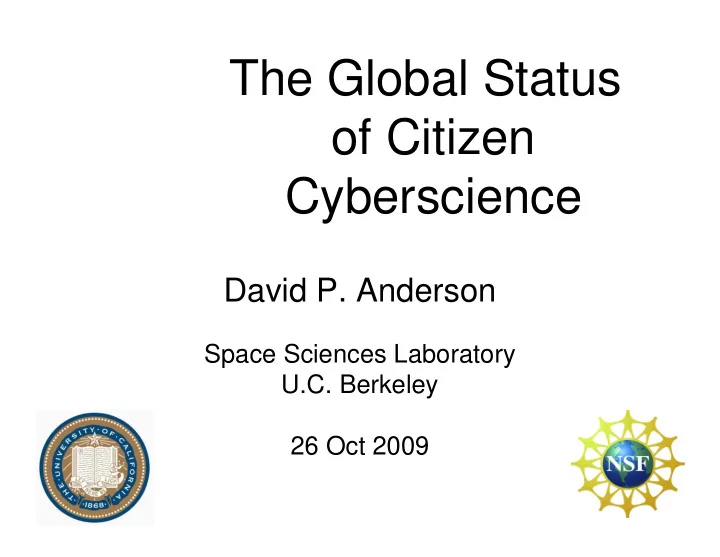

The Global Status of Citizen Cyberscience David P. Anderson Space Sciences Laboratory U.C. Berkeley 26 Oct 2009
Citizen Science Science Citizen Cyberscience Citizens 500 B.C. 1780 1900s The Internet Age
Volunteer computing Early projects • 1997: GIMPS, distributed.net – 1999: SETI@home, Folding@home – Today • 50 projects – 500K volunteers – 900K computers – 10 PetaFLOPS –
Paradigm comparison Clouds • 10 TFLOPS = US$4.3 billion/year on Amazon EC2 – Grids • about 1% the throughput of volunteer computing – Supercomputers • 12 10 8 6 4 2 0 IBM Roadrunner Volunteer computing
ExaFLOPS potential Current PetaFLOPS breakdown: • 4.6 5 4.5 4 NVIDIA 3.5 CPU 2.4 3 2.2 PS3 (Cell) 2.5 ATI 2 1.2 1.5 1 0.5 0 Processor type Potential: ExaFLOPS by 2010 • 4M GPUs * 1 TFLOPS * 0.25 availability –
BOINC Middleware for volunteer computing • client, server, web – Based at UC Berkeley Space Sciences Lab • Open source (LGPL) • NSF-funded since 2002 • http://boinc.berkeley.edu •
Science areas using BOINC Biology • protein study, genetic analysis – Medicine • drug discovery, epidemiology – Physics • LHC, nanotechnology, quantum computing – Astronomy • data analysis, cosmology, galactic modeling – Environment • climate modeling, ecosystem simulation – Math • Graphics rendering •
Climateprediction.net
Einstein@home Gravitational waves; gravitational pulsars •
GPUGRID.net
Other volunteer activities Optimize, debug, port applications • Language translations • Software testing • User support •
Distributed thinking The scientific process is mostly human • What tasks can volunteers do? • cognition (vision); logical and spatial reasoning; – creativity; real-world knowledge Spectrum of tasks • tasks that anyone can do quickly – tasks that require significant education/training – tasks where replication helps – hierarchies of tasks –
Stardust@home The Stardust mission • Where’s the dust? • Stardust@home • 23K volunteers – 43M viewings – 64 tracks found – 13 particles recovered –
Fold It!
Middleware for distributed thinking Bossa: open-source middleware for volunteer • thinking volunteer assessment – calibration jobs – replication – http://bossa.berkeley.edu – Bolt: open-source middleware for web-based • training of diverse populations
Projects in development Hominids@home • Collect photos of Middle Awash (Ethiopia) – Look for hominid and other fossils – AfricaMap •
The importance of Citizen Cyberscience teach Citizen Science supply and allocate resources
The importance of CCC CC not widely used by scientists, especially in • developing countries. Why? lack of awareness – Infrastructure gap – technical gap – CC not widely known to the public. Why? • lack of PR – CCC can solve these problems •
Recommend
More recommend